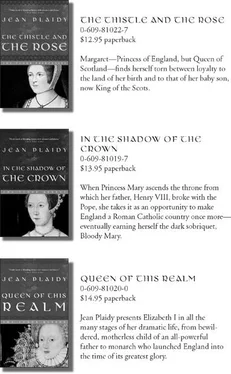Jean Plaidy - The Sixth Wife - The Story of Katherine Parr
Здесь есть возможность читать онлайн «Jean Plaidy - The Sixth Wife - The Story of Katherine Parr» весь текст электронной книги совершенно бесплатно (целиком полную версию без сокращений). В некоторых случаях можно слушать аудио, скачать через торрент в формате fb2 и присутствует краткое содержание. Жанр: Старинная литература, на русском языке. Описание произведения, (предисловие) а так же отзывы посетителей доступны на портале библиотеки ЛибКат.
- Название:The Sixth Wife: The Story of Katherine Parr
- Автор:
- Жанр:
- Год:неизвестен
- ISBN:нет данных
- Рейтинг книги:5 / 5. Голосов: 1
-
Избранное:Добавить в избранное
- Отзывы:
-
Ваша оценка:
- 100
- 1
- 2
- 3
- 4
- 5
The Sixth Wife: The Story of Katherine Parr: краткое содержание, описание и аннотация
Предлагаем к чтению аннотацию, описание, краткое содержание или предисловие (зависит от того, что написал сам автор книги «The Sixth Wife: The Story of Katherine Parr»). Если вы не нашли необходимую информацию о книге — напишите в комментариях, мы постараемся отыскать её.
The Sixth Wife: The Story of Katherine Parr — читать онлайн бесплатно полную книгу (весь текст) целиком
Ниже представлен текст книги, разбитый по страницам. Система сохранения места последней прочитанной страницы, позволяет с удобством читать онлайн бесплатно книгу «The Sixth Wife: The Story of Katherine Parr», без необходимости каждый раз заново искать на чём Вы остановились. Поставьте закладку, и сможете в любой момент перейти на страницу, на которой закончили чтение.
Интервал:
Закладка:
One of his gentlemen came in to tell him that the King’s page had brought a message for him. He was to go at once to the King’s presence, and it seemed from the King’s mood that it would not be wise to delay.
Cursing softly, Seymour went to the King’s apartment, where he knelt in reverence.
“H’m!” snorted the King, noting the rich blue satin and the sparkling sapphires and how they made the sailor’s eyes look bluer and more vivid in his suntanned face. There should be a law, thought the King, forbidding a King’s servant to deck himself in finery rivaling his King’s.
“I had word that Your Majesty desired my presence and I came with all speed.”
“You were wise there, brother,” said the King. “Wiser than you have been in some other matters.”
Seymour opened wide his blue eyes and looked at the King with astonishment. He was ready with his tongue too, the King noted.
“My Gracious Lord, if my unwisdom has offended Your Grace, pray let me know in what cause, that I may hasten to be wise.”
“Methinks,” said Henry, “that when I honor a subject with a small favor, that subject is apt to look for bigger ones.”
“It is such an honor to serve Your Grace, and Your Grace’s smiles are treasured. You must forgive your loving subjects if, having received one of your royal smiles, they crave for more.”
“Smiles! It is not smiles some look for. Some enjoy lands and treasures which not so long ago belonged to others.”
Seymour bowed his head. It was true that, as Jane Seymour’s brother, he had received lands and riches from the despoliation of the monasteries; he had grown from a humble country gentleman into a rich courtier. Was the King planning to take away that which he had given? Seymour thought uneasily of another Thomas— Cardinal Wolsey—who had at one time been the richest man, next to the King, in all England; yet he had lost everything, even his life.
“But it is not of lands that we would speak,” went on Henry. “We have been hearing rumors of your conduct, Seymour, and we do not like what we hear.”
“I am deeply grieved, Your Grace.”
“Then that is well. And, hark ye, we shall look to you to mend your ways. We have heard rumors of your gallantry, Seymour. You know what store I set on virtue….”
Seymour bowed his head even lower. It would not do for his master to see the smile which played about his mouth, and, try as he might, Thomas Seymour could not prevent its appearing there. This model of virtue! he thought. This husband of five wives—this lover of how many women! Yet in his own eyes the King remained a figure of virtue. After all, he had always put away one wife before the official ceremony of taking another, even if it meant cutting off her head.
“I know, Your Grace,” said Seymour craftily; “and if I have offended, I crave your pardon and Your Majesty’s clemency. I would remind Your Majesty that it is not easy for a humble subject to follow the example of his King.”
Henry looked sharply at the man. Insolence? Was that it? He softened in spite of himself. Liking the fellow, he could not help it. Yes, he had a liking for Tom Seymour as he had had for others. Thomas Wyatt, for instance, who was reputed to have been the lover of Anne Boleyn; Thomas Wolsey was another who had had his regard. Dear Thomas Wolsey! A good servant. Henry had long persuaded his conscience that Wolsey’s decline and death lay at the door of Anne Boleyn, as did the execution of that other favorite, Thomas More. There was yet another Thomas who was beloved of the King— Thomas Cranmer. How different was pious Cranmer—rather sly, sensitive Cranmer—from this handsome braggart who now stood before him. Perhaps he liked Cranmer for his very cunning, for his clever way of extricating his King from troubles; and he liked Tom Seymour because he was amusing, because he seemed a pale shadow of a youthful Henry.
“There has been too much gallantry, my lord,” went on Henry. “It extends, we hear, from the lowest to the highest. Take care, brother.”
“I know not what tales have been brought to Your Gracious Majesty, but whoever uttered them …”
“Lied in his throat, I don’t doubt you will tell me. Let us hope that you are right.”
“I can assure Your Gracious Majesty that it is so.”
“And,” went on the King, “that you, my lord, have never raised those handsome eyes to the Princess Elizabeth, our daughter?”
“My Gracious Lord …”
“Ah, you would have need of our gracious leniency if we found you guilty of such folly.”
“I beg Your Grace to listen to my side of the story.”
“We are listening.”
“I would not presume to raise my eyes to one so near Your Grace.”
“That is well. Eyes raised to the sun become dazzled, brother; and dazzled eyes see not clearly the dangers that lie ahead. Do not allow yourself to be blinded. Neither the Princess Elizabeth nor the Lady Jane Grey is for you, brother.”
“Indeed not, Your Majesty. If I seemed to admire these two, it was as charming children and…”
“Then all is well. You may leave us, brother.”
Seymour bowed, retired and went from the palace to his waiting barge.
He was sweating a little under his fine garments, particularly about the neck. Necks were so sensitive. How many times did the gentlemen about the King fancy they felt the touch of the ax there? One day a man was in high favor, his ambitions promising fulfillment; the next day he was being rowed to the Tower and taken through the Traitors’ Gate. It had happened to so many whom he had known.
That interview meant that, at present, he must curb his hopes. The redheaded Princess was not for him…at present. He must forget the little Lady Jane. But there was still the rich widow waiting in her late husband’s mansion; and very rich she was, and comely too. He had developed an insatiable taste for riches since his sister’s elevation. A rich wife today was a more exciting prize than a royal one in seven years’ time. Much could happen in a day, an hour. How much more could happen in seven years!
The King had stumped to his window and watched the progress of the gallant young man as he made his way toward the river.
Whither was he going? wondered Henry. It was to meet a woman, doubtless. Henry smiled slyly. Not the Princess Elizabeth, for certain. He had not been unaware of the fear he had planted in Seymour. The gallant sailor would be a little less gallant in that direction and keep his eyes from straying too high.
The King was so curious that he had one of Sir Thomas’s gentlemen brought to him.
“Whither goes your master this day?” he asked.
“To London, Your Majesty.”
“And why to London?”
“On business, as far as I know, Your Majesty.”
“What business? Out with it, knave. You know his errand and you would be wise to tell it.”
“My Lord King, if it pleases you, he has gone to call on Lady Latimer.”
The King smiled. “You may go. It is our wish that you tell not your master that we were interested in his journey. It will go ill with you if you do.”
Lady Latimer, mused the King, when the man had left. He knew her well. Kate Parr, he called her, for he remembered her as Parr’s girl. He had noticed her when she came to court, and he had liked her. She had been a good wife, first to Borough and then to Latimer. A sedate and virtuous lady. The kind of woman he liked to see about the court. And why was it he had not seen her at court? Ah, mourning Latimer, he supposed.
So Seymour was visiting her. To what end? Wealthy widow. Very wealthy widow. Those Seymours were the most avaricious men in the kingdom.
The King laughed. He believed that Seymour, knowing now that the Princess Elizabeth and the Lady Jane Grey were out of reach, was turning to the more mature charms of the widow.
Читать дальшеИнтервал:
Закладка:
Похожие книги на «The Sixth Wife: The Story of Katherine Parr»
Представляем Вашему вниманию похожие книги на «The Sixth Wife: The Story of Katherine Parr» списком для выбора. Мы отобрали схожую по названию и смыслу литературу в надежде предоставить читателям больше вариантов отыскать новые, интересные, ещё непрочитанные произведения.
Обсуждение, отзывы о книге «The Sixth Wife: The Story of Katherine Parr» и просто собственные мнения читателей. Оставьте ваши комментарии, напишите, что Вы думаете о произведении, его смысле или главных героях. Укажите что конкретно понравилось, а что нет, и почему Вы так считаете.










